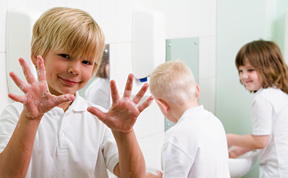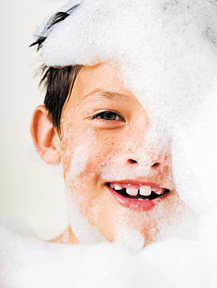MRSA Infection
MRSA is a type of staph infection that is resistant to antibiotics. Staph infections, including MRSA, occur most frequently in health care facilities.
While
Staph aureus (including MRSA) is commonly found in the nasal cavity, most are skin infections. These may appear as pustules or boils which often are red, swollen, painful or have pus or other drainage. These skin infections commonly occur at sites of visible skin trauma such as cuts and abrasions and areas of the body covered by hair, including the back of neck, groin, buttocks, armpits, and bearded area of men.
MRSA is usually transmitted by direct skin-to-skin contact or contact with shared items or surfaces that have come into contact with someone else's infection. Five factors make it easier for MRSA to be transmitted. These factors, referred to as the five C's, are as follows: crowding, frequent skin-to-skin contact, cuts (or abrasions), contaminated items and surfaces, and lack of cleanliness.
 Unfortunately, many antibiotic soaps are not very effective against MRSA, which has become increasing resistant. Alcohol's effect does not last long and dries out the skin with frequent use. For those who desire a natural product for frequent daily hand washing and nail cleaning, Manuka honey is available for both personal protection and medical treatment via dermal application.
Unfortunately, many antibiotic soaps are not very effective against MRSA, which has become increasing resistant. Alcohol's effect does not last long and dries out the skin with frequent use. For those who desire a natural product for frequent daily hand washing and nail cleaning, Manuka honey is available for both personal protection and medical treatment via dermal application.
Unlike antibiotics, manuka honey destroys bacteria by drawing water out of the microorganisms by osmosis, research suggests. Bacteria have the ability to mutate and become resistant to elements that can destroy them. However, no bacteria can survive without water. That should prevent future Manuka-resistant strains from developing. Furthermore, all honeys produce an antimicrobial peroxide reaction upon application. Uniquely, Manuka honey contains high levels of the natural antimicrobial chemical methylglyoxal. Gels, foams, creams, sprays and bandages for personal protection and/or for wound healingare currently all available.
While soaps, hydrogen peroxide and rubbing alcohol can be used for surface cleaning, a more natural approach is to use products based on environmentally friendly, nontoxic ingredients like silver ions and citric acid. Plus, it is important to use products that are long lasting, as that will make actual daily compliance much easier.
 Keep Probiotics "Handy"
Keep Probiotics "Handy"
Healthy intestinal flora and fauna is also part of a robust immune system. An article in the May 8, 2006 online edition of The Medical News Today states "Current interest in probiotics is motivated ... by the increasing antibiotic resistance of pathogenic bacteria ... and the rise of consumers' demand for natural substitutes of drugs."
M. Spigelman, a British surgeon, has a novel idea concerning probiotics and MRSA prevention: "[A]ny student who has grown bacteria in a lab will know that they (bacteria) generally do not grow on top of one another. So when we wash our hands, we could actually be killing off harmless commensals to the extent that we leave space for other bacteria, such as MRSA strains, to settle ... Perhaps we should be thinking about using probiotics and even dipping our hands after thorough washing into a solution which contains harmless bacteria, which could then colonize our skin and prevent pathogenic bacteria from settling on it." Unfortunately, I am not aware of any such probiotic hand treatment on the market as of yet.

